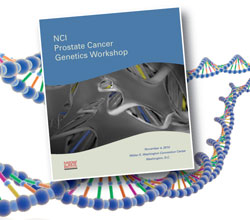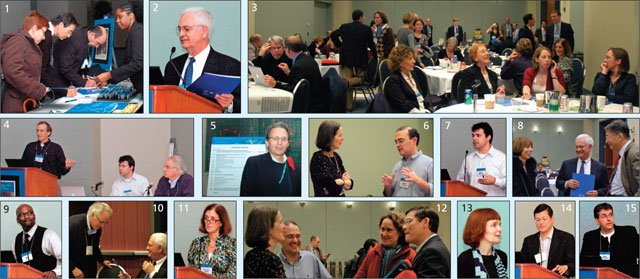Which Prostate Cancers Are Aggressive and Which Aren’t?


It is easy to tell a patient that his tumor is potentially life-threatening if there is a lot of cancer found in the biopsy specimens, the Gleason score is 7 or higher, or if the PSA level has been persistently rising at a rate of greater than 0.35 ng/ml/year, or other adverse features are noted in the biopsy specimens, such as perineural invasion, lymphovascular invasion, or extra-prostatic tumor extension.
No doctor can tell a patient definitively that his prostate cancer is not aggressive and probably not life threatening. Non-aggressive CaP has been defined as Gleason sum of 6 or less, organ-confined, cancer volume of less than 0.5 cc, and a PSA of less than 10.
Aggressive or not aggressive: That information is what every doctor and every patient wants to know.
It’s not as if researchers aren’t trying to figure out the distinction. They know it’s the big question and they want the answer.
To answer this question, Dr. Catalona and his research collaborators have organized a international group of the most respected and experienced experts in the field of the genetics of prostate cancer to attack the problem together. Under the direction of Dr. Catalona, and the auspices of the National Cancer Institute (NCI), more than 60 scientists, researchers and clinicians from over 30 institutions met in Washington DC this November to plan a collaborative effort for identifying genetic variations that are associated with aggressive prostate cancer.
”Although many research groups are studying various aspects of prostate cancer genetics, they do their work with limited genetic samples and usually with a relatively small group of researchers. We are going to share our samples, and acquire samples from many leading medical centers, thus allowing for thousands to be examined, and we are bringing together some of the best researchers in the world to plan and conduct the studies,’ Dr. Catalona said.
New Comparisons
Dr. Barry McGuire, a research fellow for Dr. Catalona sponsored largely by the Urological Research Foundation, helped prepare and coordinate the initial proposal for the NCI and administratively helped organize the first meeting with the assistance of Robin Leikin PhD, Daniel O’Brien, and Michelle Pattison of Northwestern University Feinberg School of Medicine.
McGuire said that NCI representatives dubbed the day ‘a maiden voyage’ as they felt a workshop like this one, where the most knowledgeable and experienced scientists and clinicians come together under one roof to plan such a massive project, could be a prototype for future major research projects.
“Studies comparing aggressive with non-aggressive prostate cancer have been limited. The long-term goal of this project is to create a new, virtual resource of banked samples that are richly annotated with clinical information about the patient’s case from large populations of prostate cancer patients. These samples can be used for future projects comparing the genetics of aggressive and non-aggressive prostate cancer as well as for other research projects, such as identifying men who might be candidates for research involving targeted therapies or for developing useful biomarkers for measuring response to treatment,” Dr. McGuire said.
The importance of the shared samples and the institutional collaborations cannot be over-estimated.
Compelling evidence from a variety of studies suggests a strong genetic component to susceptibility for prostate cancer and substantial evidence for genetic factors determining disease aggressiveness, but the scientific validation isn’t there yet.
For example, scientists have identified more than 30 genetic variants in the human genome that are associated with the risk of developing prostate cancer; however, none have definitively been associated with aggressive disease features.
Numbers Necessary

“Genetic testing from one institution seldom can provide the numbers necessary to validate a study. It’s going to take tens of thousands of patients to deliver the information, especially for rare genetic variants that might be associated with a high risk for aggressive disease, such as the BRCA1 and BRCA2 mutations for breast cancer,” Dr. Catalona said.
In addition to using genetic markers to select high-risk men for CaP screening, information on determining genetic markers that identify men at risk for aggressive cancer would help with treatment decisions.
The purpose of this workshop was to bring together experts in the field of genetics to “brainstorm” and develop a framework for submitting a grant application to study the genetics of aggressive prostate cancer. Years of collaborative work are ahead.
“Hopefully, this planning workshop was only a beginning,” Dr. Catalona said.
Making Collaborations Work Better
An abundance of DNA is banked in multiple institutions, ready to be analyzed and used in studies to find the reliable markers for aggressive prostate cancers.
A preliminary survey carried out by Dr. Catalona and his research group tentatively estimated close to 25,000 samples in SPORE sites (Specialized Program of Research Excellence: Baylor, Fred Hutchinson, University of Washington/ Vancouver, Harvard, Johns Hopkins, Mayo Clinic, Northwestern/University of Chicago, MD Anderson, University of Michigan, Memorial Sloan-Kettering, University of California Los Angeles, and University of California San Francisco) that meet the criteria for aggressive or non-aggressive CaP.
The main focus of the workshop was to capitalize on the knowledge and experience of researchers to plan for a massive research project using these samples and others. A second goal was to establish data sharing and transfer agreements for using the samples in important research.
Meeting Results
Researchers at this workshop presented the most recent findings and promising new studies in the field of prostate cancer genetics. Discussions in sessions created a set of recommendations regarding specimen and data collection, management, and analysis specific to CaP genetics.
This information will be distributed to appropriate personnel at each attendee’s institution to inform best practices and to move toward standardized procedures across institutions.
Anticipated future studies will involve genome sequencing as these technologies become more sophisticated and affordable. The experimental design and informatics issues of these new approaches are in an early phase of development, but the workshop included speakers already experienced in these areas of genetic research.
Potential for Results
The potential of this collaborative work cannot be overstated.
The major objective is to find genetic variants that associate with aggressive prostate cancer and develop tests to identify their presence.
Such tests would have the potential to pinpoint more accurately those individuals at highest risk of disease progression and could help reduce unnecessary treatment for non-aggressive prostate cancer.
Not only would the markers assist in identifying high-risk individuals for targeted screening and prevention programs, but also they could provide new tests to assist in treatment decisions.
Furthermore, a large and accessible biobank could provide fundamental insights into the biology of prostate cancer and identify new treatment and prevention strategies.
This project was years in the making and it will take years to complete, but the collaborative work has begun. And the potential is enormous.
“We have taken one step forward. Now we must keep the momentum going and apply for funding to bring this research closer to our patients,” Dr. Catalona said.
A Sampling of Participants

- Conference Registration
- William J. Catalona MD, Northwestern University
- Overview of meeting participants
- John Witte PhD, University of California, San Francisco;
Elliott Margulies PhD, and Stephen Chanock MD, National Institute of Health - William Issacs PhD, John Hopkins University
- Janet Stanford PhD, Fred Hutchinson Cancer Research Center
and Matthew Freedman MD, Dana-Farber Cancer Institute - Elliott Margulies PhD, National Human Genome Research Project
- Robin Leikin PhD, Northwestern University; William J. Catalona, MD;
Chung Lee PhD, Northwestern University - Rick Kittles MD, University of Illinois at Chicago
- William J. Catalona MD, Northwestern University with Stephen Chanock MD
- Kathy Cooney MD, University of Michigan
- Janet Stanford PhD; Matthew Freedman MD;
Elizabeth M. Gillanders PhD, National Cancer Institute;
Timothy Rebbeck PhD, University of Pennsylvania - Laufey Amundaddttir, PhD, National Cancer Institute
- Timothy Rebbeck, PhD, University of Pennsylvania
- Julius Gudmundsson PhD, deCODE genetics











